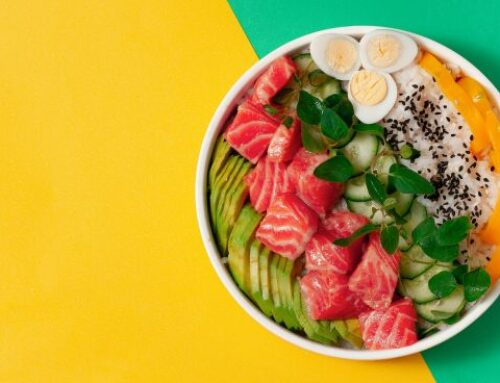3 Foods That Belong on Your Shopping List (and 3 That Don’t)
Losing weight and building lean muscle doesn’t have to be hard or painful. It’s not about restriction and sacrifice. And it’s not about starving yourself or spending hours in the gym each day. It’s more about putting the right foods in your shopping cart, building a positive mindset, and having the correct information at your fingertips.
These three things are in your control and accessible to you, but you’ll need a place to start. Consider this article your guide to getting started. We’ll share three healthy, plant-based sources of protein and complex carbohydrates to pick up at the store or your local farmer’s market.
Everything we’ll share is staple foods in the Mediterranean diet that trace back to countries like Greece, Croatia, Italy, Lebanon, and Turkey.
Legumes
Besides fish, legumes are a significant source of lean protein for those who eat a Mediterranean diet. They’re a great protein option for vegetarians and vegans. They consist of lentils and chickpeas, along with black, pinto, lima, and kidney beans. Both lentils and chickpeas (garbanzo beans) offer high protein and fiber content, so we’ll explore these ones in detail.
Lentils
You can use lentils to make soups or cook them separately to toss in with a fresh garden salad, it’s your choice. A small 1 cup serving size has 18 grams of protein or 36% of your daily requirement. They also provide a plethora of minerals like potassium, phosphorus, magnesium, iron, manganese, and zinc.
In addition, lentils are rich in soluble and insoluble fibers that assist with optimal digestion and stool elimination.
Chickpeas (Garbanzo beans)
This is a versatile food that you can buy in the whole form, in cans, or get your
serving from hummus. Chickpeas, a staple of the Mediterranean diet, gives you 14.5 grams of protein per cup (29% of DV) and 50% of your daily fiber needs.
Nuts & Seeds
Nuts and seeds are one of the most nutrient-dense food groups on the planet. They’re popular in Mediterranean countries and well-regarded for being a healthy source of protein and fat.
Let’s take a look at some common nuts and seeds in the Mediterranean diet and their macro-and micro-nutrient profiles.
Walnuts
Have you ever looked at a walnut up close? Did you notice it’s shaped like the human brain? Nature has a funny way of letting us in on her little secrets. And based on their nutrient profile and some research studies, we know walnuts are in fact, good for our brain.
Walnuts are rich in omega-3 fatty acids and polyphenols, which have the ability to fight inflammation and oxidative stress. These two factors have a major influence on our cognition and the state of its health or decline. In other words, our brains stand to benefit by including walnuts into our diet.
When we eat 1/4 cups of walnuts, we get 113% of our daily value (DV) of omega-3’s. That’s astounding. Also, this portion gives us 4.5 grams of protein (9% of DV) and 19.5 grams of fat (25% of DV).
Almonds
Almonds are another popular nut enjoyed by people living in Mediterranean regions. By eating 1/4 cup, you get 5 grams of protein or 10% of your daily protein needs.
Although nuts and fats, in general, get a bad rap for causing weight gain, this is a misconception and has no scientific basis. Only adulterated and hydrogenated fats like margarine, certain vegetable oils, and trans fat are unhealthy.
But fats from natural sources that come straight from mother earth like nuts and seeds are nothing to fear or be afraid of. In fact, fat burns fat and gives us a long-sustaining source of fuel, unlike sugars (simple carbs) that only provide a quick burst of energy that fades away in less than a few hours.
To illustrate this point, let’s look at a study published in The American Journal of Clinical Nutrition. More than 8,000 adults participated in the study and were asked to eat a serving of nuts at least twice a week for 28 months. The results showed that these adults were 31% less likely to gain weight compared to the group that never or hardly ever ate nuts.
Sesame seeds
Besides offering lots of B-vitamins, sesame seeds are a good source of lean protein.
For every 1/4 cup, there are 6.4 grams of protein (13% of DV). This serving size also offers 15% of your daily fiber, 35% of your daily calcium, and 6% of your daily Omega-3 needs.
In addition to sprinkling some sesame seeds over your salad, you can grind them up into a thick paste called tahini, or buy an organic tahini spread from the store.
Vegetables
By now, we know the importance of getting fresh vegetables into our diet each and every day. There’s no denying this. But, the execution can be difficult. Not all vegetables taste delicious, but the more we get them into our bodies, the more we’ll begin to crave them.
The cultures who live the longest consume a ton of vegetables. And to make them tasty, they drizzle olive oil and garnish them with herbs like basil or parsley. It’s all about making them appetizing, so you look forward to eating them.
Furthermore, veggies have a ton of minerals and vitamins and are a premier source of complex carbohydrates. By definition, complex carbs consist of fiber and starch and are vital to long-term health. They improve your digestion system, a critical component to maintaining a healthy weight.
Here are some wonderful, nutritious vegetables and their macro-and micro-nutrient profiles.
Many of these foods also contain antioxidants that help fight free radicals and protect our cells from oxidation. There are more than a few reasons to eat vegetables — are you convinced yet?
Three food groups are often mistaken as healthy and why to avoid them.
Now, let’s discuss three food groups you don’t want in your grocery cart or in your kitchen.
Processed Meats
On the one hand, processed meats like turkey, roast beef, and ham make a quick snack and are part of a high protein diet, many people follow to build muscle. But, convenience doesn’t necessarily equate to health, which is the case here.
Besides being linked to cancer (due to high carcinogen content), high cholesterol, and heart disease, processed meats are not ideal for weight loss either.
The processing of meats results in excessive sodium levels, which then results in water retention. And too much water retention makes us bloated for one and makes it nearly impossible to shed pounds.
If you love meat, poultry, or fish, then opt for grass-fed, organic, wild-caught, hormone, and antibiotic-free choices from a local farmer or natural foods store. Quality is of the utmost importance when it comes to animal-based proteins. Your health is an investment, so spending the extra money now will pay off later.
Granola
The problem with store-bought granola is the sugar content and the level of processing. Today, there’s a general consensus that sugar does nothing positive for our waistline or our health. Sugar is not a macro or micro-nutrient, so there’s no physiological need for it. Also, excessive intake of sugar is one of the biggest factors of weight gain.
Secondly, processed food means a longer shelf life, but it also destroys precious enzymes making it more difficult for the food to digest and metabolize. And that leads to digestive issues and upset.
So, although granola may be touted as a health food, if you’re not considering a sprouted, whole grain, low sugar, minimally processed granola from a reputable brand, buying it is not a good decision.
Dairy Products
This food group is hotly debated. Registered dietitians, nutritional therapists, and functional medicine gurus have their own set of opinions when it comes to dairy.
Traditionally, dairy products like raw milk, fresh cheese, and yogurts were the main source of protein and fats for many cultures around the world. And for some, it still is. However, we’re talking about the dairy supply in western societies where people buy these foods from the grocery store, not a local farm.
The main problem with industrialized dairy is quality. Many dairy products have been pasteurized and homogenized. This is done for safety reasons, but as a result, many nutrients and benefits get lost. Also, it’s common to find chemicals, antibiotics, and hormones inside dairy products.
So, this is problem number one. The other issue with dairy is the digestibility factor. Since the type of fat present in milk, cheese, and yogurt consists of long-chain fatty acids, it takes a long time for our bodies, mainly our digestion track, to break them down and convert them into energy.
Also, having a weak digestion system or a lack of good gut bacteria makes it challenging to digest them as well.
In short, all these three food groups can prevent you from achieving your weight loss goals and building lean muscle. So, stick with the healthy lean protein foods and complex carbs we mentioned above. Between that and regular exercise, you’ll be on your way to a healthy body inside and out.
RECOMMENDED FOR YOU
MOST POPULAR
3 Foods That Belong on Your Shopping List (and 3 That Don’t)
Losing weight and building lean muscle doesn’t have to be hard or painful. It’s not about restriction and sacrifice. And it’s not about starving yourself or spending hours in the gym each day. It’s more about putting the right foods in your shopping cart, building a positive mindset, and having the correct information at your fingertips.
These three things are in your control and accessible to you, but you’ll need a place to start. Consider this article your guide to getting started. We’ll share three healthy, plant-based sources of protein and complex carbohydrates to pick up at the store or your local farmer’s market.
Everything we’ll share is staple foods in the Mediterranean diet that trace back to countries like Greece, Croatia, Italy, Lebanon, and Turkey.
Legumes
Besides fish, legumes are a significant source of lean protein for those who eat a Mediterranean diet. They’re a great protein option for vegetarians and vegans. They consist of lentils and chickpeas, along with black, pinto, lima, and kidney beans. Both lentils and chickpeas (garbanzo beans) offer high protein and fiber content, so we’ll explore these ones in detail.
Lentils
You can use lentils to make soups or cook them separately to toss in with a fresh garden salad, it’s your choice. A small 1 cup serving size has 18 grams of protein or 36% of your daily requirement. They also provide a plethora of minerals like potassium, phosphorus, magnesium, iron, manganese, and zinc.
In addition, lentils are rich in soluble and insoluble fibers that assist with optimal digestion and stool elimination.
Chickpeas (Garbanzo beans)
This is a versatile food that you can buy in the whole form, in cans, or get your
serving from hummus. Chickpeas, a staple of the Mediterranean diet, gives you 14.5 grams of protein per cup (29% of DV) and 50% of your daily fiber needs.
Nuts & Seeds
Nuts and seeds are one of the most nutrient-dense food groups on the planet. They’re popular in Mediterranean countries and well-regarded for being a healthy source of protein and fat.
Let’s take a look at some common nuts and seeds in the Mediterranean diet and their macro-and micro-nutrient profiles.
Walnuts
Have you ever looked at a walnut up close? Did you notice it’s shaped like the human brain? Nature has a funny way of letting us in on her little secrets. And based on their nutrient profile and some research studies, we know walnuts are in fact, good for our brain.
Walnuts are rich in omega-3 fatty acids and polyphenols, which have the ability to fight inflammation and oxidative stress. These two factors have a major influence on our cognition and the state of its health or decline. In other words, our brains stand to benefit by including walnuts into our diet.
When we eat 1/4 cups of walnuts, we get 113% of our daily value (DV) of omega-3’s. That’s astounding. Also, this portion gives us 4.5 grams of protein (9% of DV) and 19.5 grams of fat (25% of DV).
Almonds
Almonds are another popular nut enjoyed by people living in Mediterranean regions. By eating 1/4 cup, you get 5 grams of protein or 10% of your daily protein needs.
Although nuts and fats, in general, get a bad rap for causing weight gain, this is a misconception and has no scientific basis. Only adulterated and hydrogenated fats like margarine, certain vegetable oils, and trans fat are unhealthy.
But fats from natural sources that come straight from mother earth like nuts and seeds are nothing to fear or be afraid of. In fact, fat burns fat and gives us a long-sustaining source of fuel, unlike sugars (simple carbs) that only provide a quick burst of energy that fades away in less than a few hours.
To illustrate this point, let’s look at a study published in The American Journal of Clinical Nutrition. More than 8,000 adults participated in the study and were asked to eat a serving of nuts at least twice a week for 28 months. The results showed that these adults were 31% less likely to gain weight compared to the group that never or hardly ever ate nuts.
Sesame seeds
Besides offering lots of B-vitamins, sesame seeds are a good source of lean protein.
For every 1/4 cup, there are 6.4 grams of protein (13% of DV). This serving size also offers 15% of your daily fiber, 35% of your daily calcium, and 6% of your daily Omega-3 needs.
In addition to sprinkling some sesame seeds over your salad, you can grind them up into a thick paste called tahini, or buy an organic tahini spread from the store.
Vegetables
By now, we know the importance of getting fresh vegetables into our diet each and every day. There’s no denying this. But, the execution can be difficult. Not all vegetables taste delicious, but the more we get them into our bodies, the more we’ll begin to crave them.
The cultures who live the longest consume a ton of vegetables. And to make them tasty, they drizzle olive oil and garnish them with herbs like basil or parsley. It’s all about making them appetizing, so you look forward to eating them.
Furthermore, veggies have a ton of minerals and vitamins and are a premier source of complex carbohydrates. By definition, complex carbs consist of fiber and starch and are vital to long-term health. They improve your digestion system, a critical component to maintaining a healthy weight.
Here are some wonderful, nutritious vegetables and their macro-and micro-nutrient profiles.
Many of these foods also contain antioxidants that help fight free radicals and protect our cells from oxidation. There are more than a few reasons to eat vegetables — are you convinced yet?
Three food groups are often mistaken as healthy and why to avoid them.
Now, let’s discuss three food groups you don’t want in your grocery cart or in your kitchen.
Processed Meats
On the one hand, processed meats like turkey, roast beef, and ham make a quick snack and are part of a high protein diet, many people follow to build muscle. But, convenience doesn’t necessarily equate to health, which is the case here.
Besides being linked to cancer (due to high carcinogen content), high cholesterol, and heart disease, processed meats are not ideal for weight loss either.
The processing of meats results in excessive sodium levels, which then results in water retention. And too much water retention makes us bloated for one and makes it nearly impossible to shed pounds.
If you love meat, poultry, or fish, then opt for grass-fed, organic, wild-caught, hormone, and antibiotic-free choices from a local farmer or natural foods store. Quality is of the utmost importance when it comes to animal-based proteins. Your health is an investment, so spending the extra money now will pay off later.
Granola
The problem with store-bought granola is the sugar content and the level of processing. Today, there’s a general consensus that sugar does nothing positive for our waistline or our health. Sugar is not a macro or micro-nutrient, so there’s no physiological need for it. Also, excessive intake of sugar is one of the biggest factors of weight gain.
Secondly, processed food means a longer shelf life, but it also destroys precious enzymes making it more difficult for the food to digest and metabolize. And that leads to digestive issues and upset.
So, although granola may be touted as a health food, if you’re not considering a sprouted, whole grain, low sugar, minimally processed granola from a reputable brand, buying it is not a good decision.
Dairy Products
This food group is hotly debated. Registered dietitians, nutritional therapists, and functional medicine gurus have their own set of opinions when it comes to dairy.
Traditionally, dairy products like raw milk, fresh cheese, and yogurts were the main source of protein and fats for many cultures around the world. And for some, it still is. However, we’re talking about the dairy supply in western societies where people buy these foods from the grocery store, not a local farm.
The main problem with industrialized dairy is quality. Many dairy products have been pasteurized and homogenized. This is done for safety reasons, but as a result, many nutrients and benefits get lost. Also, it’s common to find chemicals, antibiotics, and hormones inside dairy products.
So, this is problem number one. The other issue with dairy is the digestibility factor. Since the type of fat present in milk, cheese, and yogurt consists of long-chain fatty acids, it takes a long time for our bodies, mainly our digestion track, to break them down and convert them into energy.
Also, having a weak digestion system or a lack of good gut bacteria makes it challenging to digest them as well.
In short, all these three food groups can prevent you from achieving your weight loss goals and building lean muscle. So, stick with the healthy lean protein foods and complex carbs we mentioned above. Between that and regular exercise, you’ll be on your way to a healthy body inside and out.












